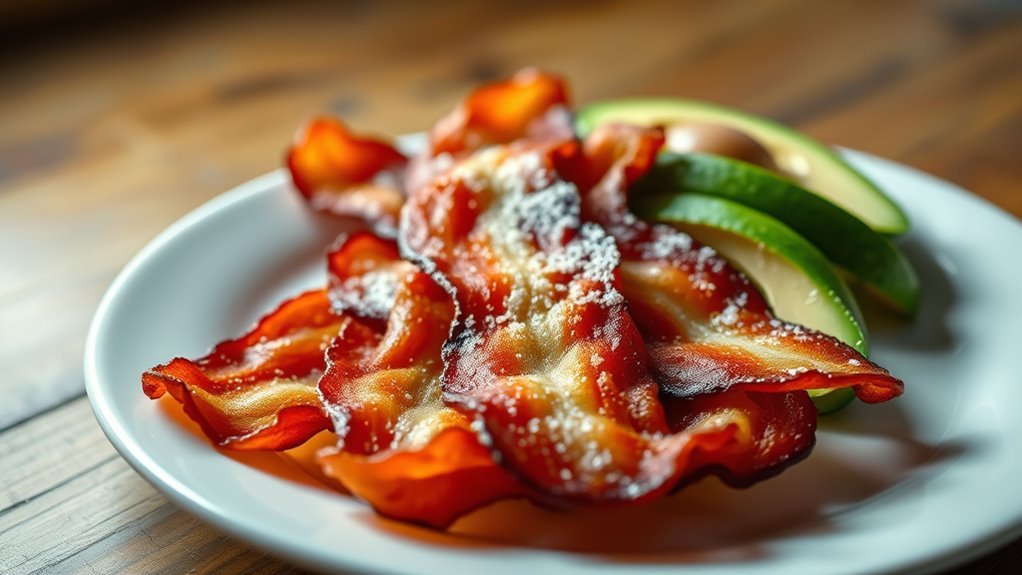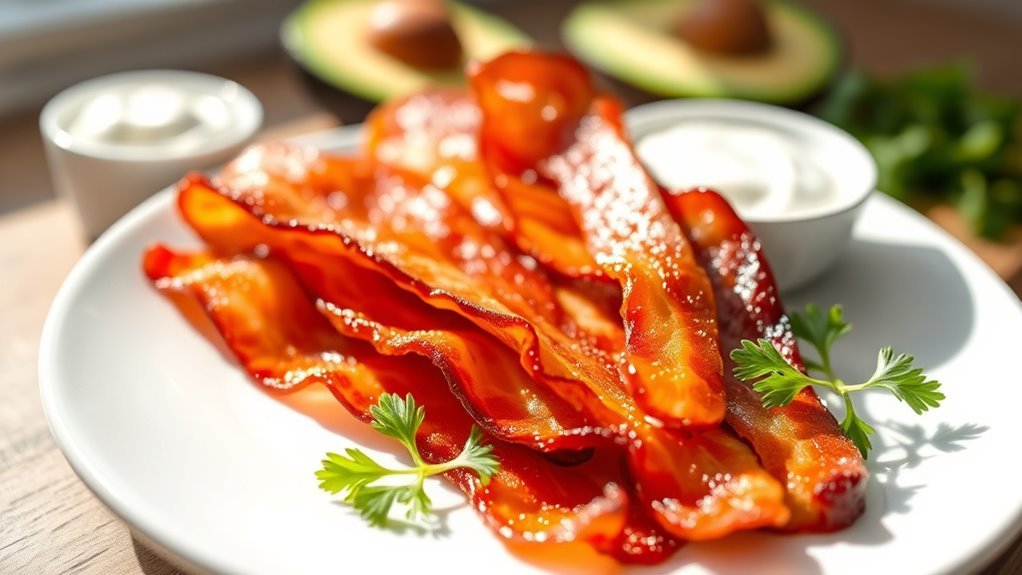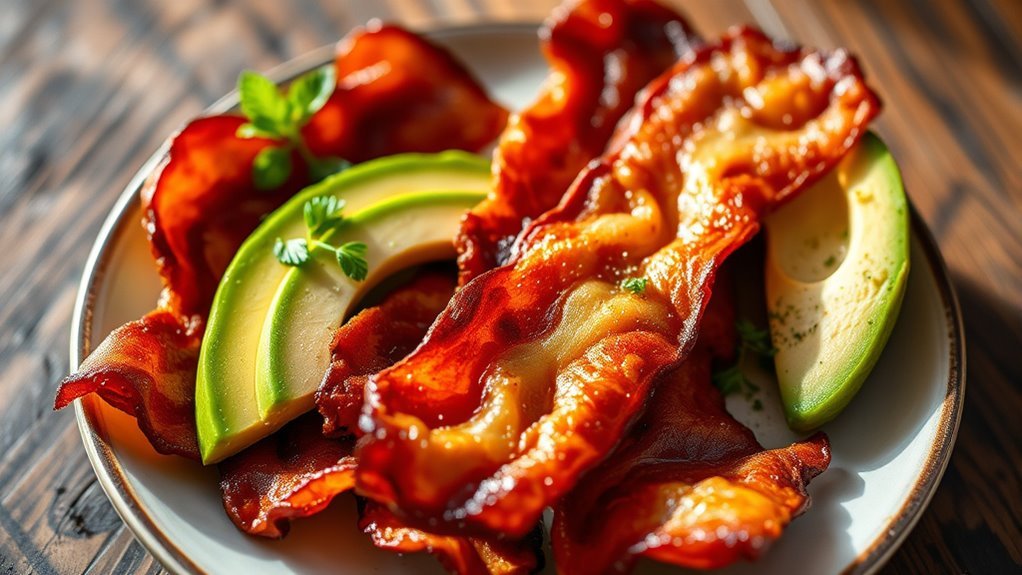Turkey bacon can be a good fit for a keto diet since it contains lower carbohydrates and higher protein levels. With about 5-6 grams of protein per serving, it offers a lean protein source while keeping fat intake in check. Just be mindful of sodium levels and choose minimally processed varieties for the best health benefits. Interested in incorporating turkey bacon into your meals? There’s a lot more to discover about its versatility and nutritional advantages.
Nutritional Overview of Turkey Bacon

When considering turkey bacon, it’s important to look at its nutritional profile. Turkey bacon generally contains lower calories and fat compared to traditional pork bacon, making it an appealing option for those seeking healthier choices. Its protein content is decent, usually around 5-6 grams per serving, which can help support muscle maintenance and overall satiety. However, you should pay attention to the fat quality; some brands may use unhealthy additives or fillers. Opting for minimally processed varieties can enhance your dietary freedom while keeping your health goals in check. Remember, balance is key, so consider turkey bacon as a component of a varied diet rather than a sole protein source.
Comparing Turkey Bacon to Traditional Bacon

While both turkey bacon and traditional pork bacon have their unique appeal, comparing their nutritional profiles reveals key differences that can influence your dietary choices.
| Nutrient | Turkey Bacon | Traditional Bacon |
|---|---|---|
| Calories | 60 | 42 |
| Protein (g) | 4 | 3 |
| Fat (g) | 4.5 | 3.3 |
Turkey bacon taste can be milder than its pork counterpart, which some might prefer. When it comes to cooking methods, both can be pan-fried or baked, but turkey bacon often requires a bit more attention to achieve crispiness. Understanding these differences helps you make informed decisions about which type aligns best with your dietary goals.
How Turkey Bacon Fits Into Your Macro Goals

If you’re following a keto diet, incorporating turkey bacon can be a strategic choice for meeting your macro goals. With its lower fat content compared to traditional bacon, turkey bacon offers a leaner protein source, making it easier to manage your macro tracking while still enjoying flavorful meals. A typical serving provides around 12 grams of protein, which can help you meet your daily protein needs without exceeding your fat limits. When you’re balancing your macros, turkey bacon can fit seamlessly into breakfasts, salads, or wraps, allowing you to maintain that freedom in your meal planning. Just be mindful of sodium levels, and consider pairing it with healthy fats to create a well-rounded dish that aligns with your keto objectives.
Potential Health Benefits of Turkey Bacon
Although turkey bacon often gets a bad rap compared to its pork counterpart, it can offer several potential health benefits that may appeal to those on a keto diet. One of the key advantages is its status as a lean protein source, which means you can enjoy a satisfying meal while managing your fat intake. Turkey bacon typically contains fewer calories and less saturated fat than traditional bacon, making it a heart-healthier option. Additionally, it’s rich in essential nutrients like B vitamins and selenium, which support energy metabolism and immune function. By incorporating turkey bacon into your meals, you can indulge in a flavorful protein while reaping the health benefits that align with your keto lifestyle. Enjoy the freedom of choice without compromising your goals!
Tips for Incorporating Turkey Bacon Into a Keto Diet
Incorporating turkey bacon into your keto diet can be both enjoyable and nutritious, especially when you consider its versatility in meals. You can explore various cooking methods, like pan-frying, baking, or air-frying, to achieve that crispy texture you love. For breakfast, try adding turkey bacon to scrambled eggs or an omelet packed with veggies. At lunch, toss it into a salad for added protein and flavor. Dinner options include wrapping it around asparagus or chicken for a savory twist. Don’t forget about snacks—turkey bacon can be a great addition to cheese platters. With these recipe ideas, you’ll find it easy to enjoy turkey bacon while staying within your keto goals, embracing delicious freedom in your meals.
Frequently Asked Questions
Is Turkey Bacon Gluten-Free?
Yes, turkey bacon’s generally gluten-free. When you check the turkey bacon ingredients, you’ll often find just turkey, seasoning, and sometimes preservatives. However, always read the label to verify there’s no cross-contamination. Nutritionally, turkey bacon tends to be lower in fat than traditional bacon, making it a suitable option if you’re looking for a leaner alternative. Enjoy the freedom to savor your favorite breakfast without worrying about gluten!
Can Turkey Bacon Be Eaten Raw?
You shouldn’t eat turkey bacon raw. It’s typically sold uncooked and can harbor harmful bacteria, making raw consumption unsafe. Cooking turkey bacon not only enhances its flavor but also guarantees food safety by killing any potential pathogens. Nutritionally, turkey bacon can be a lower-fat alternative to traditional bacon when cooked properly, allowing you to enjoy its taste without compromising your health. Always prioritize safety and enjoy it cooked!
How Should Turkey Bacon Be Stored?
Storing turkey bacon’s a bit like tucking a treasure away; you want to keep it safe! To guarantee freshness, always place it in the fridge immediately after buying. Keep it in its original turkey bacon packaging or transfer it to an airtight container. Proper refrigeration helps prevent spoilage, and it’s best consumed within a week of opening. If you’re not using it soon, consider freezing for longer storage without compromising its taste!
What Is the Shelf Life of Turkey Bacon?
Turkey bacon typically has a shelf life of about one week in the refrigerator once opened, and it can last up to six months in the freezer. When you’re considering cooking methods, remember that the nutritional content can vary based on how you prepare it. Whether you fry, bake, or microwave, the way you cook it impacts both its flavor and health aspects. Always check for any off smells or changes in color before consuming.
Are There Any Additives in Turkey Bacon?
Yes, turkey bacon often contains additives like preservatives, flavorings, and sometimes sodium nitrite, which can raise additive concerns. It’s important to check labels for ingredient transparency. Some brands offer products with minimal additives, focusing on whole ingredients, which might align better with your dietary preferences. By choosing turkey bacon with fewer additives, you can enjoy this alternative while being mindful of your health goals and maintaining a balanced approach to your nutrition.
Frequently Asked Questions about Turkey Bacon and Keto Diet
1. Is turkey bacon keto-friendly?
Yes, turkey bacon can be considered keto-friendly. It is typically lower in fat and calories compared to traditional pork bacon, but it still contains protein and can fit within the macronutrient ratios of a ketogenic diet. However, it’s important to check the nutrition label, as some brands may add sugars or fillers that could increase carbohydrate content.
2. How many carbs are in turkey bacon?
The carbohydrate content in turkey bacon can vary by brand, but on average, it contains about 0 to 2 grams of carbs per slice. This low carb count makes it suitable for those following a keto diet, as the goal is to keep daily carb intake under 20-50 grams to maintain ketosis.
3. What are the nutritional benefits of turkey bacon?
Turkey bacon is a leaner alternative to traditional bacon, providing protein with less fat. It typically contains around 30% less fat than pork bacon, making it a good option for those looking to reduce calorie intake. Additionally, it offers vitamins such as B6 and niacin, which are important for energy metabolism.
4. Can I eat turkey bacon every day on a keto diet?
While turkey bacon can be included in a keto diet, it’s best to consume it in moderation. Relying solely on processed meats may not provide a balanced intake of nutrients. Incorporate a variety of protein sources, such as whole eggs, fish, poultry, and plant-based proteins, alongside turkey bacon for a well-rounded diet.
5. Are there any downsides to eating turkey bacon on keto?
One downside of turkey bacon is that it can be highly processed, and some brands may contain additives, preservatives, and high sodium levels. Additionally, the lower fat content means that it may not provide the same richness and flavor as traditional bacon. Always choose high-quality, minimally processed turkey bacon, and be mindful of your overall sodium intake.
References
- https://www.healthline.com/nutrition/turkey-bacon-keto
- https://www.ketodietapp.com/Blog/post/2020/04/02/Turkey-Bacon-Keto-Friendly-or-Not
- https://www.ncbi.nlm.nih.gov/pmc/articles/PMC6313448/
- https://www.livestrong.com/article/490908-is-turkey-bacon-keto-friendly/
- https://www.verywellfit.com/turkey-bacon-nutrition-facts-5089161
- https://www.webmd.com/diet/obesity/what-is-keto-diet
- https://www.health.harvard.edu/staying-healthy/the-ketogenic-diet
- https://www.cdc.gov/healthyweight/healthy_eating/index.html


